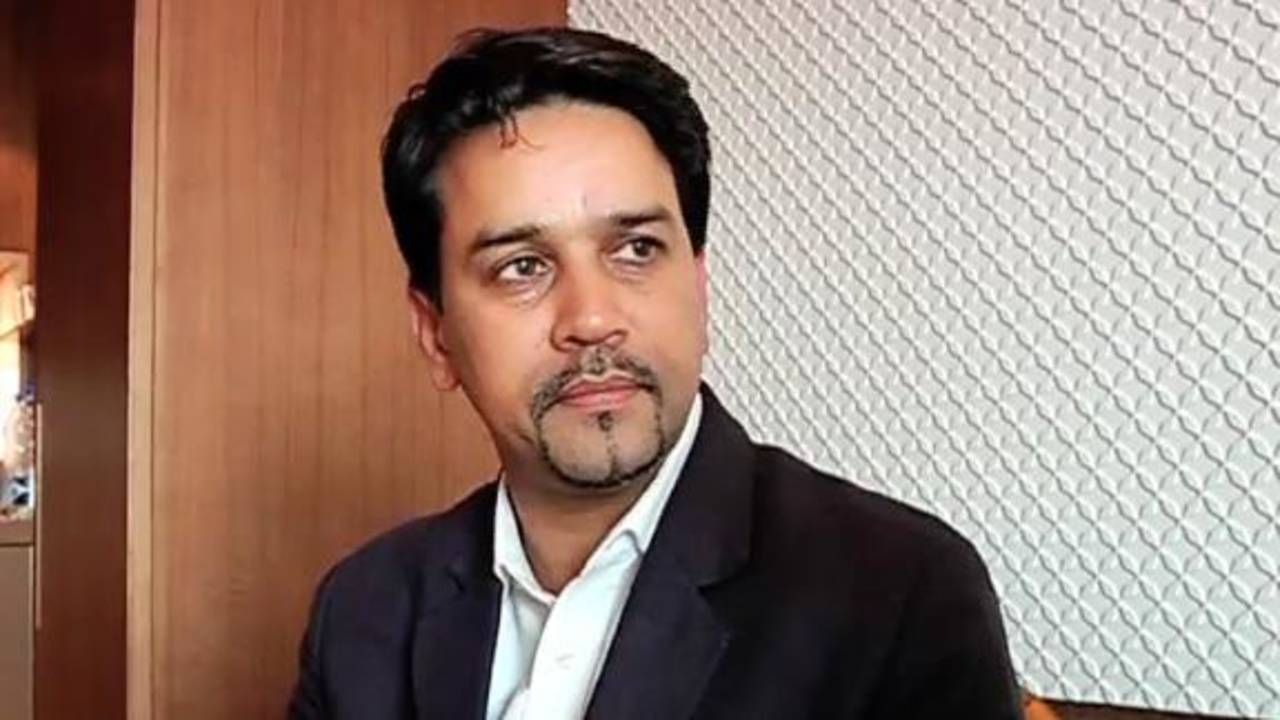Who is Anurag Thakur?
Anurag Thakur steadily ascended the BCCI's ladder in the 2000s, and was the first sign of any opposition to N Srinivasan's style of functioning during the IPL corruption scandal
Amol Karhadkar
03-Mar-2015
While introducing BCCI's new secretary Anurag Thakur, a television reporter talking to his camera said, "We have with us the newly-appointed BCCI secretary Anurag…" Thakur interrupted him and said, "Let's do it again. I am elected, not appointed." Politicians take pride in being elected, no matter what the election, and Thakur is no exception. A member of parliament and career politician, Thakur has become a familiar face in BCCI over the past decade, seasoned in its own dynamics.
Barely 24 hours before voting in the election, as Jagmohan Dalmiya stood firm in his desire to contest the presidential post and turn down the offer of being a 'patron-in-chief', Thakur also happened to be the most sought-after man on both sides. At one point, N Srinivasan had offered Thakur a nomination for the BCCI presidency and the requisite support from East Zone to stand against Dalmiya, but the offer was turned down. Sharad Pawar's men managed to retain Thakur as the face of their campaign, and the candidate for secretary's post. On Thakur's part it was an enormous gamble that paid off - by a single vote.
A three-time MP from the Hamirpur constituency in Himachal Pradesh and the son of a former chief minister of the state, Thakur also happens to be the chief of the youth wing of the BJP, India's ruling political party.
Now 40, he steadily ascended the BCCI's ladder in the 2000s, building on his work to bring international cricket to the stadium in Dharamsala. Thakur took over the reins of the HPCA in 2000, at the age of 25, and began to represent the association in the BCCI. Early on in his administrative tenure, he was embroiled in a controversy for having possibly become the first cricketer to have made his first-class debut after taking over as the president of the association. That debut enabled his induction into the national junior selection committee, satisfying the condition that only first-class players could be national selectors. Since then, Thakur has come a long way and has been joint secretary for the last three years. He had the credentials and ability but he could not get two supporters from the East Zone, whose turn it was to nominate the president till 2017, either by himself or through the Pawar lobby.
Once he was elected as secretary, pipping holder Sanjay Patel, the staunchest Srinivasan loyalist, by a solitary vote, he did not want to talk about the elections "once they are over." Asked why he'd settled for the secretary's post when he had the chance of becoming president, Thakur said, "Let us rest that issue. The more important issue is how to resolve the controversies. And how to popularise the game from here on."
Ever since his induction into the administrative set-up as joint secretary, Thakur had been in the thick of action through Srinivasan's controversial reign as the BCCI chief. As Srinivasan stubbornly continued to stick to his post despite the arrest of his son-in-law during the IPL corruption scandal, Thakur chose to remain as distant from him and his cosy club as possible. And as Srinivasan's inaction over the issue concerning his son-in-law and his IPL franchise dragged on, towards the end of May 2013, Thakur had appeared on television channels asking the board to convene a meeting to take action. It was the first sign of any opposition to Srinivasan's style of functioning.
A few hours after being elected secretary, Thakur said he did not agree with the charge that the BCCI had been converted into a monopoly over the last three years. "We have an internal democracy. Every member is free to give his viewpoint. Yes, people in positions have to take decisions. But as far as the functioning of the BCCI is concerned, I think no one can say this that there was any dictatorship or monopoly. I think everyone had that freedom of speech as far as the BCCI members are concerned," Thakur told ESPNcricinfo.
Once the election was done, the seasoned politician in Thakur was determined to keep the flock together. He had no hesitation in admitting the game had lost its credibility during the last two years, but he said that he and Dalmiya would work towards restoring it. "We all are here to deliver in the interest of the game of cricket and to repose the faith [of fans] in the game, which is the most important [challenge]," Thakur said. "We will take every step required to take cricket to the next level. Cricket in the last few years has gone through a lot. We just want it to give it a new look. And with an experienced man like Mr Dalmiya with us and with a young team, we all are here to unanimously deliver, contribute in the interest of the game."
The Thakur-Dalmiya partnership is not a new one. While Arun Jaitley, India's finance minister and a former BCCI vice-president, is his political guru, Thakur spent his early lessons as the prodigy of Dalmiya during the former ICC chief's heydays. A little over a decade ago, when Dalmiya was running Indian cricket single-handed, Thakur used to be his blue-eyed boy. He was one of Dalmiya's trusted lieutenants in the 2004 BCCI election, possibly the murkiest, when Dalmiya blocked Pawar's entry into BCCI.
The wheel is turning for Thakur - by the time the next BCCI election is held, in 2017, it will be North Zone's turn to nominate a candidate. Thakur would be a frontrunner for holding the top post.
Amol Karhadkar is a correspondent at ESPNcricinfo
